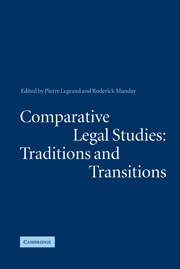Book contents
- Frontmatter
- Contents
- List of contributors
- Introduction
- Comparative legal studies and its legacies
- Comparative legal studies and its boundaries
- Comparative legal studies and its theories
- Comparative legal studies and its futures
- 12 Comparatists and transferability
- 13 Comparatists and extraordinary places
- Conclusion
- Index
13 - Comparatists and extraordinary places
Published online by Cambridge University Press: 18 December 2009
- Frontmatter
- Contents
- List of contributors
- Introduction
- Comparative legal studies and its legacies
- Comparative legal studies and its boundaries
- Comparative legal studies and its theories
- Comparative legal studies and its futures
- 12 Comparatists and transferability
- 13 Comparatists and extraordinary places
- Conclusion
- Index
Summary
Introduction
What can contemporary comparative legal studies say in a world radically different from the one covered by such studies up until now? Can the comparatists of today enter this new and different world with their existing strategies and accommodate differences by building on, or modifying, these strategies and so extend the scope of comparative analysis beyond the jurisdictions ordinarily dealt with? In my view, the future entails change, both in the perception and practice of comparative legal studies and in its interaction with other disciplines investigating the phenomena of legal and social cultures.
Traditionally, most comparatists have come from the western legal traditions. They have been mainly interested in the comparison of common law and civil law and in the expansion of these two legal traditions, considering the ‘totally other’ only in this context. The emphasis has either been on similarities between similars, or even between differents, and differences between differents – but rarely between similars. Each of these strategies has its own agenda. Sometimes, the purpose is to indicate that the world is divided between two traditions, sometimes to show that there is a global rapprochement or, at least, a rapprochement between common law and civil law and, more recently, between socialist law and civil law. Sometimes, the goal is to point out that ‘never the twain shall meet’ and, sometimes, to show that ‘we are all changing and changing in the same direction, so what do the differences matter anyway?’
- Type
- Chapter
- Information
- Comparative Legal Studies: Traditions and Transitions , pp. 467 - 490Publisher: Cambridge University PressPrint publication year: 2003
- 10
- Cited by



